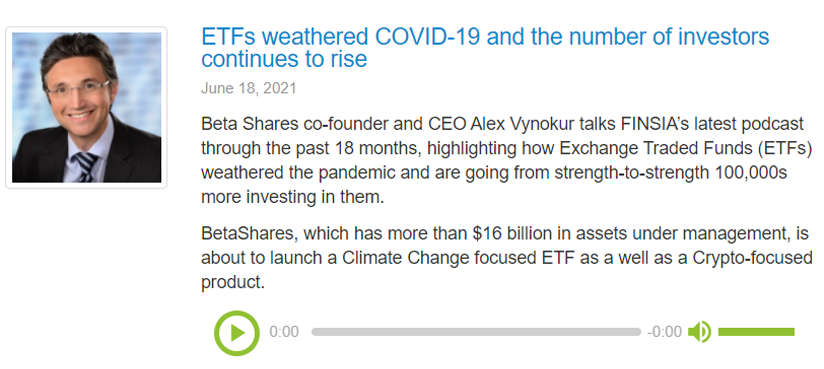Exchange Traded Funds passed their biggest stress test during COVID and added hundreds of thousands more investors.
BetaShares founder Alex Vynokur reflects on the boost to the low-cost, bundled investments during the latest FINSIA podcast.
Alex – whose business has just removed Tesla from its sustainability ETFs – also talks about how the adoption of ESG-focused funds had resulted in some angry phone calls from chairmen of “very high profile companies”.
Crypto currencies also come under the spotlight of the Betashares managing director as part of the wide ranging conversation that can be accessed here.
“The thing I’m really proud of and really happy to reflect on as I think about the last 12 to 15-month period, is that ETFs were dealt a very significant stress test,” says Alex.
“And I’m not just talking about BetaShares ETFs, I’m talking about ETF industry overall.
“Reports from 2019 – going back every year – said ETFs do well when times are okay, but just you wait until times are not okay. That’s going to be a real litmus test.
“And I’m really happy that we have as an industry gone through the calamity of the COVID disruption in the markets with flying colours. ETFs have delivered exactly what they say on the box.”
As well as an increase in several hundred Investors, including first-timers and experienced investors, the business grew funds under management from just shy of $10billion at the start of 2020 to $17.5bn this year.
Many investors bought for the first time, looking to buy the dip. While experienced investors with cash balances deployed those cash balances in more favourable market conditions, says Alex.
“What we have seen in 2020 is a really significant growth in the number of investors that started to allocate funds away from cash into the markets and ETFs, and again, I’m not just talking here about BetaShares, I’m talking about the ETF industry.
“I think that litmus test that I was talking about before, the stress test, had given a lot of people who were sitting on the fence, confidence that ETFs do deliver what they’re supposed to deliver.”
When it comes to sustainability and ETFs, Alex acknowledges a large number of investors need convincing.
“ESG is a subject matter, which is quite divisive in a way,” he says.
“There’s certainly, certainly still a large number of investors who do have the belief that investing ethically comes at the expense of investment returns.
“We certainly do not believe so. We believe what’s important in ESG is delivering true-to-label investment exposures, investing with values as opposed to investing to tick the box.
“We have seen significant progress in areas such as engagement with companies that we are investing in.
“We had become quite unpopular with certain boards in Australia by excluding companies, for instance, because they don’t have gender diversity on the board.
“I’ve had angry calls from chairman of some very high-profile companies who basically were complaining around why BetaShares does not allocate or had excluded a certain company from the portfolio.
“It’s a really interesting space. It is growing fast.
“We are seeing that younger investors, on the one hand, are adopting ESG, essentially as a core.
“On the other end of the spectrum, a significant number of family offices, of non-for-profit organisations, are allocating their portfolios towards sustainability and ESG-aware strategies.”
When it comes to crypto, he says BetaShares has been watching the evolution in crypto markets and Bitcoin in particular for quite a number of years.
And while the business has been cautious about them, he admits: “It is fair to say that there is significant amount of interest and significant amount of demand from investors.
“We take responsibilities of looking after our investors’ assets extremely seriously. And the one question that we have been very focused on is about the safe custody of assets.
“We have seen a number of instances around the world over the past five years where various unregulated crypto exchanges had been hacked into and people’s money disappear.
“Today, probably hundreds of thousands of Australian investors obtain their investment in cryptocurrency through such unregulated exchanges.
“So, the idea of a Bitcoin ETF or cryptocurrency ETF actually being available on a regulated exchange with transparency around pricing has a lot of merit relative to the world of unregulated exchanges.
“So, as a business, when we’ve looked a few years ago at the viability of launching cryptocurrency ETF, we had certainly not been confident that the ecosystem is institutional enough to be able to support a Bitcoin ETF as an example.
“However, what we have seen over the last 12, 18 months’ time, is that you’ve now got firms such as Coinbase, firms such as Fidelity, BNY Mellon moving into the business of custodying crypto assets.
“You are seeing a number of investment banks, whether it’s Morgan Stanley, whether it’s Goldman Sachs, and a number of others, are starting to offer institutional services to participants in that industry.”

